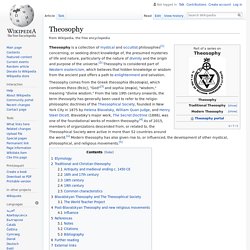

Theosophy. Theosophy comes from the Greek theosophia (θεοσοφία), which combines theos (θεός), "God"[3] and sophia (σοφία), "wisdom," meaning "divine wisdom.

" From the late 19th century onwards, the term theosophy has generally been used to refer to the religio-philosophic doctrines of the Theosophical Society, founded in New York City in 1875 by Helena Blavatsky, William Quan Judge, and Henry Steel Olcott. Blavatsky's major work, The Secret Doctrine (1888), was one of the foundational works of modern theosophy.[4] As of 2015[update], members of organizations descended from, or related to, the Theosophical Society were active in more than 52 countries around the world. [a] Modern theosophy has also given rise to, or influenced, the development of other mystical, philosophical, and religious movements.[5] Astral projection.
Esotericism. Esotericism (or esoterism) signifies the holding of esoteric opinions or beliefs,[1] that is, ideas preserved or understood by a small group of those specially initiated, or of rare or unusual interest.[2] The term derives from the Greek, either from the comparative ἐσώτερος (esôteros), "inner", or from its derived adjective ἐσωτερικός (esôterikos), "pertaining to the innermost".[3] The term can also refer to the academic study of esoteric religious movements and philosophies, or to the study of those religious movements and philosophies whose proponents distinguish their beliefs, practices, and experiences from mainstream exoteric and more dogmatic institutionalized traditions.[4] Although esotericism refers to an exploration of the hidden meanings and symbolism in various philosophical, historical, and religious texts, the texts themselves are often central to mainstream religions.

For example, the Bible and the Torah are considered esoteric material.[7] Etymology[edit] Definition[edit]